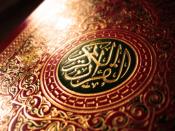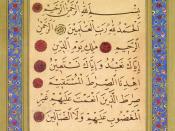Islam holds a unique claim in comparative religion that its sacred scripture, the Qur'an, is not the fallible work of men writing their personal accounts of a long dead teacher but the infallible dictated word of God. This essay will give an overview of modern scholars thoughts on the origin, collection and development of the text. We shall begin with Noldeke's account of the chronology of the text and move to look at Bell's and Wansbrough's ideas before examining other aspects of Qur'anic coherence.
Watts on Bell's Translation
Watts writes that of Western attempts at forming a chronology of the Qur'an the "most important book by far was Theodor Noldeke's Geschichte des Qorans". Noldeke's method was founded in traditional Muslim accounts of Qur'anic revelation and made use of early Muslim sources to construct a historical framework. From this starting point he assumed progressive changes in style from "exalted poetical passages" in the early years to "long prosaic deliverances" later.
Noldeke can thus distinguish four separate periods in Qur'anic revelation. The first Meccan period is distinguished by short suras and verses, and rhymic, visual language. The second Meccan period illustrates the key theme of the text in nature and history. The use of ar-Rahman (The Merciful) is used in reference to God. In the third Meccan period the characteristics of the second period intensify, ar-Rahman ceases to be used. For Noldeke the Medinan period was not so much a change in style, rather a change in theme, concentrating on laws and practices of the early Muslim community. In should be pointed out here that Noldeke's order of suras is very similar to that used in the first Qur'an printed in Egypt by and for Muslims in 1925, differing only in the order of four suras. Watts believes Noldeke's chronology places...


